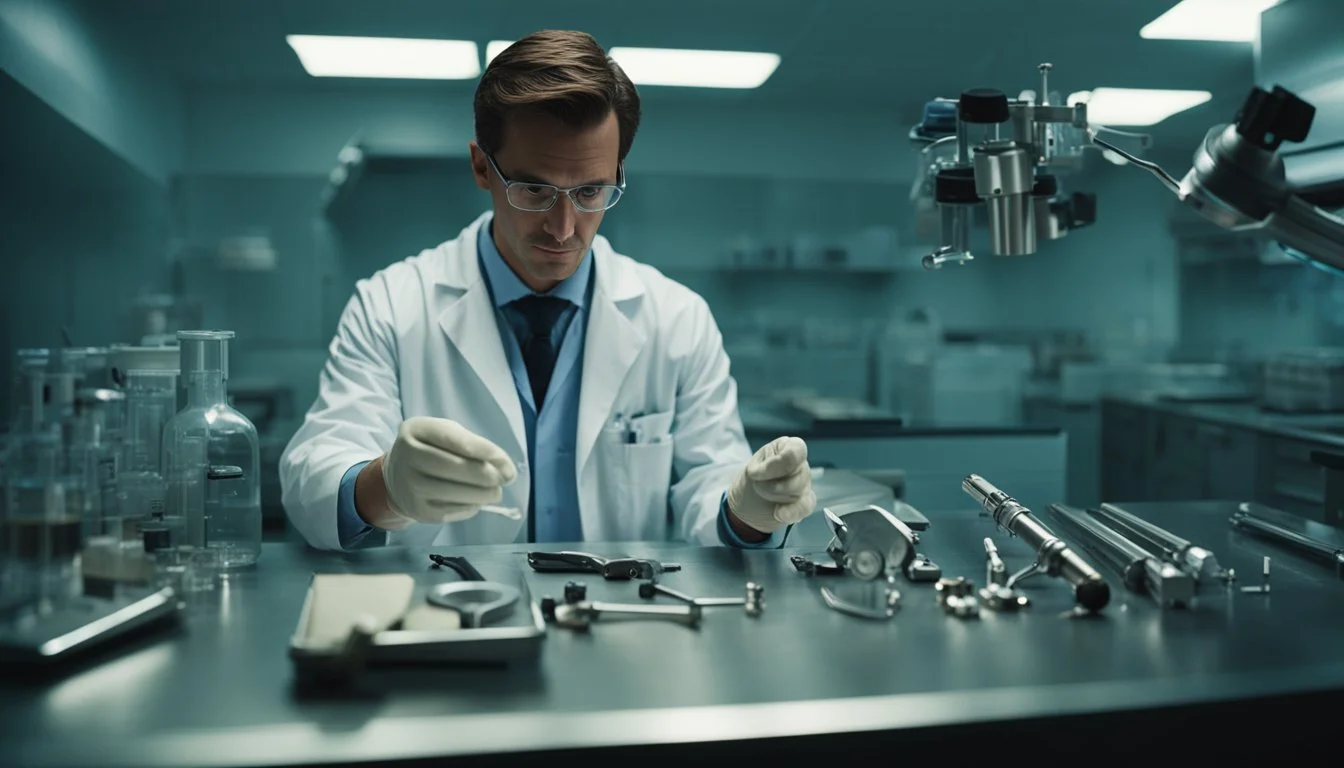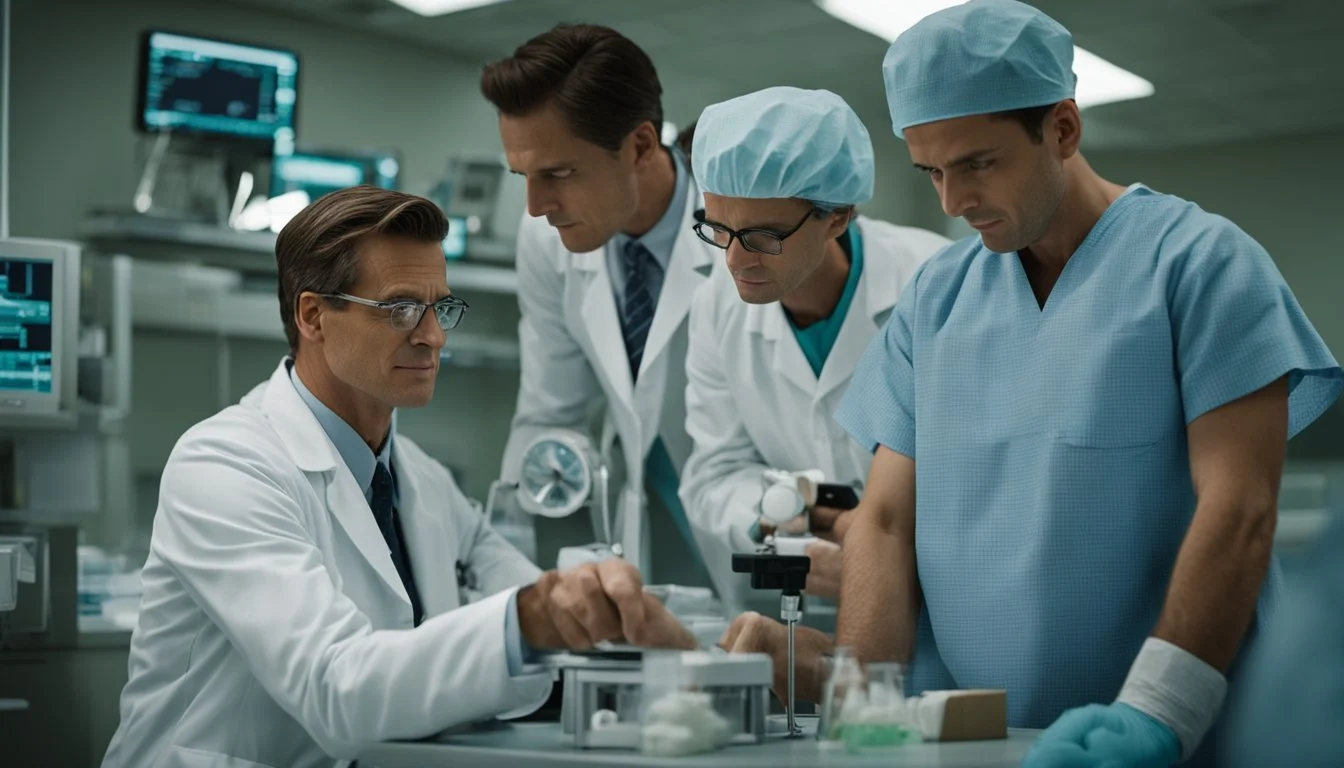Exciting Documentaries About Doctors
Insights into the Medical Profession
Documentaries offer a compelling lens into the lives and challenges of doctors across diverse backgrounds and medical disciplines. They allow viewers to gain a nuanced understanding of the intricacies of healthcare and the dedication required in the medical profession. While dramatized television series about medicine may captivate with their storylines, it's the authenticity and real-life drama of these documentaries that provide a deeper appreciation for the individuals who commit their lives to healing others.
Medical documentaries expose audiences to the inner workings of hospitals, the intensity of emergency rooms, and the complexities of surgery that are often hidden from public view. They highlight the advances in medical technology and research, as well as the emotional and ethical struggles faced by healthcare professionals. From the high-stakes decisions of brain surgeons to the day-to-day routines of obstetricians and the pressing concerns of public healthcare systems, these films give a voice to the experiences of various doctors, allowing viewers to connect with their realities on a human level.
Engaging with these documentaries also poses crucial questions about the healthcare industry, societal expectations of doctors, and the impact of medical interventions on the lives of patients. They stir a conversation on topics such as the prescribing of stimulant medications to children and adults, the effects of healthcare privatisation, and the motivations driving individuals in this high-pressure field. These narratives cultivate a respect for the medical community while fostering informed discussions on healthcare policy and reform.
Junior Doctors: On The Front Line (2019)
"Junior Doctors: On The Front Line" is a 2019 documentary series that aired on BBC Three. It provides a meticulous account of the lives and challenges faced by junior doctors working in the National Health Service (NHS) in the United Kingdom.
Throughout the series, viewers gain an exclusive entry into the high-pressure environment that these young medics navigate daily. The four-part series artfully captures the intricate balance between their personal lives and the demanding nature of their profession.
Key Themes:
The steep learning curve for new medics
Patient interactions and the complexities therein
Balancing long hours with personal life
This documentary is characterized by its raw, unfiltered glimpse into the hospital settings, showcasing real events and predicaments that junior doctors encounter. It serves as an educative piece, bringing to light both the resilience required in medical professions and the vulnerability of these key workers in the health care system.
Extremis (2016)
"Extremis" is a 2016 American short documentary that provides an intimate look at the complex and emotional decisions involved in end-of-life care. Under the direction of Dan Krauss, the film is a powerful portrayal of the dilemmas faced by patients, families, and healthcare providers.
Located in Oakland, California, the documentary is set in the ICU of Highland Hospital. The central figure of the film is Dr. Jessica Zitter, a specialist in palliative care. She is portrayed guiding families through the agonizing choices regarding the treatment of their loved ones, who are often terminally ill or reliant on life support.
With a run time of only 24 minutes, "Extremis" is concise yet impactful, giving audiences a glimpse into the ethical and personal challenges that arise at the end-of-life juncture. The documentary highlights the importance of empathy and understanding in the medical field, especially in the ICU where life and death decisions are a routine.
Through its candid and respectful approach, "Extremis" has contributed meaningfully to discussions about mortality, medical ethics, and the human condition.
The Surgeon’s Cut (2020)
The Surgeon’s Cut is a compelling docuseries that premiered on Netflix in December 2020. The series showcases the work and personal narratives of four ground-breaking surgeons who are also seen as pioneers in their respective fields. Through their eyes, the audience gains insight into the complexities and triumphs of a life dedicated to surgical innovation.
Episode Highlights:
Saving Life Before Birth: This episode features Dr. Kypros Nicolaides, a leading fetal medicine specialist. He is portrayed managing complex pregnancy complications with compassion and innovation, providing viewers with an intimate look at the emotional and technical challenges involved in his field.
Each episode serves as both a biography and a career retrospective, furthering the understanding of the surgeon's life-work impact. The Surgeon’s Cut stands out not just as a medical documentary but as an enlightened journey into the minds and hearts of those pushing the boundaries of medicine and surgery. The series gains its strength from its humanistic approach, allowing the surgeons to share their philosophies and motivations, alongside the intricate details of their innovative procedures.
Diagnosis (2019)
"Diagnosis" is a documentary series that premiered on Netflix in 2019. It features Dr. Lisa Sanders, a physician who is renowned for her work in diagnosing challenging medical cases. The series is an adaptation of her column in The New York Times Magazine, and it utilizes a novel approach to medical problem-solving known as "wisdom of the crowd."
The concept revolves around presenting patients with unexplained illnesses to a global audience. This crowdsourcing endeavor aims to harness the collective intelligence of numerous minds in search of accurate diagnoses and potential treatments.
Key Features:
Release: August 16, 2019
Format: Streaming television series
Approach: Crowdsourced diagnosis
Based on: Dr. Lisa Sanders' New York Times Magazine column
The series has been marked by its insightful exploration into the lives of patients who are desperately seeking answers to their medical mysteries. Through collective intelligence, "Diagnosis" illustrates the power of community-driven problem solving in healthcare.
Making Rounds (2015)
"Making Rounds" is a compelling 2015 documentary film that transports its audience into the intense and complex world of medical education within a cardiac critical care unit. The film follows two veteran doctors from the Mount Sinai Health System as they demonstrate their comprehensive and compassionate approach to patient care. Over the course of one month, viewers are given a window into the physicians' daily routines, observing their interactions with patients and their commitment to accurate diagnoses.
The documentary sheds light on a critical issue: misdiagnosis. Despite the United States spending upwards of a trillion dollars on high-tech medical tests annually, it is reported that approximately 20% of patients are misdiagnosed. This revelation suggests systemic issues within healthcare and underscores the importance of traditional, thorough medical evaluations.
Directed by Muffie Meyer, "Making Rounds" highlights a methodology of the doctors that could point towards solutions for the healthcare crisis in the U.S. By showcasing the intricacies of patient care from the doctors’ perspective, the film advocates for a return to the basics of doctor-patient engagement as a way to improve outcomes.
"Making Rounds" serves as an educational tool and a narrative of dedication in the medical field, offering an inside look at both the challenges and rewards that physicians encounter in the quest to provide exceptional care.
Lenox Hill (2020)
"Lenox Hill" is a documentary series that premiered on Netflix on June 10, 2020. The series offers a close look at the professional and personal lives of four healthcare professionals working at the renowned Lenox Hill Hospital in New York City.
The hospital's environment is captured through the eyes of two neurosurgeons, an emergency room physician, and an OB-GYN. These doctors are portrayed as deeply committed to their patients, showcasing the healthcare challenges they face every day as well as the emotional toll their jobs take on them.
Developed by Ruthie Shatz and Adi Barash, the documentary aims to provide an unfiltered look into the lives of medical professionals. It’s noted for its realism, the series eschewing drama for a more down-to-earth portrayal of the medical profession.
Critics emphasize the series' importance in the current context, highlighting the dedication of medical staff that often goes unnoticed. "Lenox Hill" is recognized for its informative and engaging storytelling, making it a significant addition to medical documentary features.
Given the pressures and rewards of the medical field, Lenox Hill shines a spotlight on the intricacies of healthcare and the humanity of those who work within it.
The C Word (2016)
The C Word is a documentary film directed and written by Meghan L. O'Hara, who is also a cancer survivor. Narrated by the esteemed actor Morgan Freeman, this 90-minute film received an IMDb rating of 7.5/10 and explores the theme of cancer prevention. It highlights the importance of lifestyle in combating this disease, challenging conventional Western medicine approaches that are more focused on treatment rather than prevention.
The documentary draws on the research of Dr. David Servan-Schreiber, a prominent French neuroscientist and physician who advocated for integrative approaches to cancer care. His perspective is instrumental in the film, sharing his experiences and insights on how certain industries can contribute to the risk of cancer.
Viewers are taken on a transformative journey, mapping out the “industries of death” — a term the film uses to describe elements in society that may contribute to cancer risk. The film’s thesis doesn't shy away from discussing the "science of prevention," offering a blend of personal narrative and scientific exploration which delivers a poignant message about the cancer fight, prevention, and the medical community's response to this global health issue.
Fire In The Blood (2013)
"Fire In The Blood" is a compelling documentary film directed and written by Dylan Mohan Gray. The film exposes a critical health crisis, where Western pharmaceutical companies and governments impeded access to affordable AIDS drugs in the global south following 1996, a decision that had dire consequences for millions of people.
Notable details:
Director and Writer: Dylan Mohan Gray
Focus: The obstruction to low-cost antiretroviral drugs for HIV/AIDS
Regions Impacted: Africa and other parts of the global south
The narrative uncovers the monopolistic actions of multinational pharmaceutical companies, which, along with Western governments, enforced patent monopolies. This strategy significantly increased the cost of life-saving medications, effectively denying treatment to countless individuals.
In terms of impact, the film points out the staggering number of unnecessary deaths—totaling more than ten million—attributed to the restriction of medication access. The film's investigation into these actions reveals a story of not just corporate profit over people but also the relentless efforts of activists to combat this injustice.
Gray's documentation method combines interviews and archival footage to construct a historical account of the situation, implicating corporate greed and highlighting the ethical responsibilities ignored during this period.
Fire In The Blood received recognition for its precise and hard-hitting portrayal of a humanitarian crisis, making it an essential watch for those interested in the intersection of global health, economics, and human rights.
Conclusion
Documentaries on the work and experiences of doctors provide an intimate glimpse into the complexities and challenges faced within the medical profession. Films like "JFK: What the Doctors Saw" focus their lens on the aspect of medical forensics, exploring the critical role doctors played during pivotal moments in history. They examine the evidence with a clinical eye, often uncovering new findings and perspectives.
Educational series, such as those featured on PBS, reveal the rigorous process of becoming a physician and the ongoing commitment to improvement. They often pose the question of what the future holds for medical education and how doctors can continuously evolve along with medical technologies and procedures.
In summary, documentaries serve not only to inform the public of the intricacies within the medical field but also to challenge medical professionals themselves to reflect on their practice and the wider implications of their work. They stand as poignant, educational tools melding clinical insights with societal impacts, urging viewers to consider the multifaceted nature of healthcare.
#junior doctor diaries #healthcare workers #documentary focuses #future generations #american healthcare #medical shows


